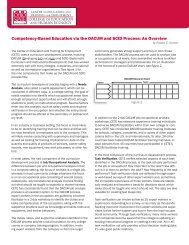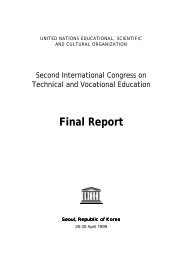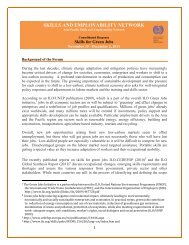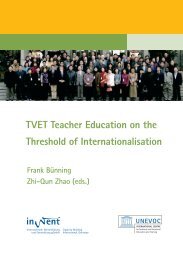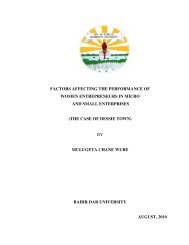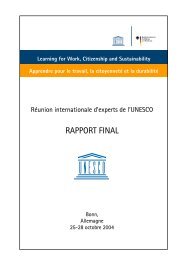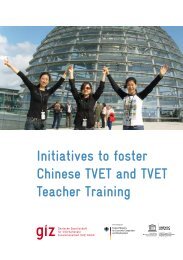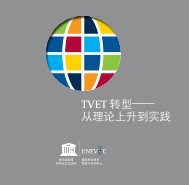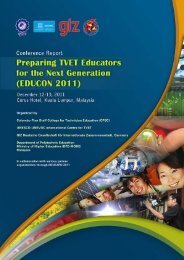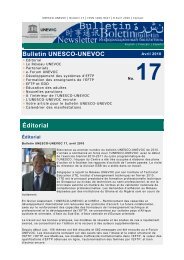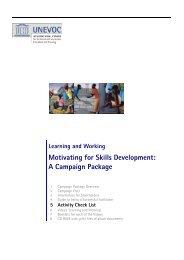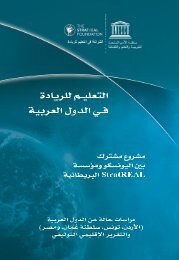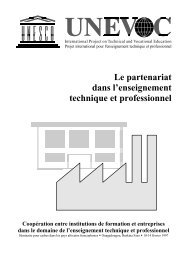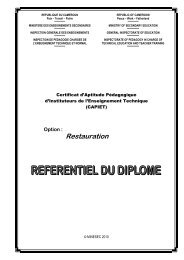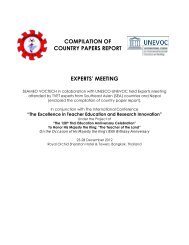Green TVET and Education for Sustainable ... - Unesco-Unevoc
Green TVET and Education for Sustainable ... - Unesco-Unevoc
Green TVET and Education for Sustainable ... - Unesco-Unevoc
You also want an ePaper? Increase the reach of your titles
YUMPU automatically turns print PDFs into web optimized ePapers that Google loves.
Korea<br />
Ms. Hee Jung Son, Water Resources<br />
Training Team, K-Water Academy, Korea Water<br />
Resources Corporation in her presentation stated<br />
that the tapping of water resources has been a vital<br />
aspect of the Korean economic boom. e provision<br />
of water <strong>for</strong> agricultural industrial <strong>and</strong> household<br />
use is being supervised by the central government<br />
ocials <strong>and</strong> the Korea Water Resources Corporation<br />
(K-Water). Water resource management is also<br />
heavily supported by laws pertaining to conservation,<br />
protection <strong>and</strong> preservation of the water supply.<br />
16 |<br />
Structure of the K-Water Courses in Water <strong>Education</strong><br />
Currently, K-water has embarked on several projects<br />
that has done by their training programs in achieving<br />
their desired methods <strong>and</strong> increasing awareness<br />
towards water resource conservation on <strong>TVET</strong>. is<br />
includes water training program <strong>for</strong> local ocials,<br />
K-water expert program, CRP (Competency<br />
rein<strong>for</strong>cement plan) <strong>and</strong> water training course <strong>for</strong><br />
<strong>for</strong>eign ocials. is programs aim to boost the<br />
development of <strong>TVET</strong> <strong>for</strong> water sustainability <strong>and</strong><br />
to provide support to the laws <strong>and</strong> policies m<strong>and</strong>ated<br />
by the government which targets entire workers in<br />
the water industry to upgrade Korea’s overall water<br />
technology level. A continuous upgrade of the<br />
training programs, as well as innovations in education<br />
is required to meet the self-evolving dem<strong>and</strong>s of the<br />
customer.<br />
Malaysia<br />
Mr. Muhammad Rumzi Bin Namat,<br />
Principal Assistant Director,<br />
Curriculum Development <strong>and</strong> Evaluation Division,<br />
International Experts Workshop on<br />
<strong>Green</strong> <strong>TVET</strong> <strong>and</strong> <strong>Education</strong> <strong>for</strong> <strong>Sustainable</strong> Development: Capacity Development Needs <strong>for</strong> Water <strong>Education</strong><br />
September 13-17, 2010 | Munich, Germany<br />
Department of Polytechnic <strong>Education</strong> discussed that<br />
a National Water Vision, which roughly states that<br />
Malaysia will be able to conserve <strong>and</strong> manage its water<br />
resources to ensure adequate <strong>and</strong> safe water, was its<br />
guiding principle in fullling the increase in the water<br />
resource needs in the years to come. e Ministry of<br />
Higher <strong>Education</strong> is taking steps to strengthen <strong>TVET</strong><br />
institutions through various educational programs to<br />
address water sustainability.<br />
e lack of the number of polytechnics running<br />
the environmental program in environmental<br />
engineering was discussed as a major challenge<br />
in the initiatives taken by educators in addressing<br />
sustainability education. It was then recommended<br />
that they learn from their neighboring counterparts<br />
on conducting more specialized programs of<br />
study in the areas of sustainable development <strong>and</strong><br />
environmental conservation. e integration of water<br />
<strong>and</strong> sustainability issues into the existing curriculum<br />
is also a daunting task, since it should be responsive<br />
to the current issues <strong>and</strong> trends.<br />
Pakistan<br />
Mr. Abdul Hafeez K<strong>and</strong>hir, Assistant<br />
Professor, Government College of Technology<br />
stressed that the increasing pressure on the<br />
population, industrialization <strong>and</strong> irrigation, as well as<br />
shortage of rainwater <strong>and</strong> snowfall from the natural<br />
sources are the major natural challenges Pakistan is<br />
facing with regards to its water supply. On the other<br />
h<strong>and</strong>, the lack of water education <strong>and</strong> training, as<br />
well as the intensity of internal <strong>and</strong> external conicts<br />
is having an adverse eect on the Pakistani water<br />
system management.<br />
e 2010 oods that inundated parts of the Pakistani<br />
l<strong>and</strong>scape has displaced millions <strong>and</strong> brought damage<br />
to property <strong>and</strong> livelihood. It is then, necessary that<br />
proper management of the water systems should be<br />
done to at least mitigate the eects of the loss of life<br />
<strong>and</strong> distribute the water resources more eciently to<br />
the country’s arid areas.



